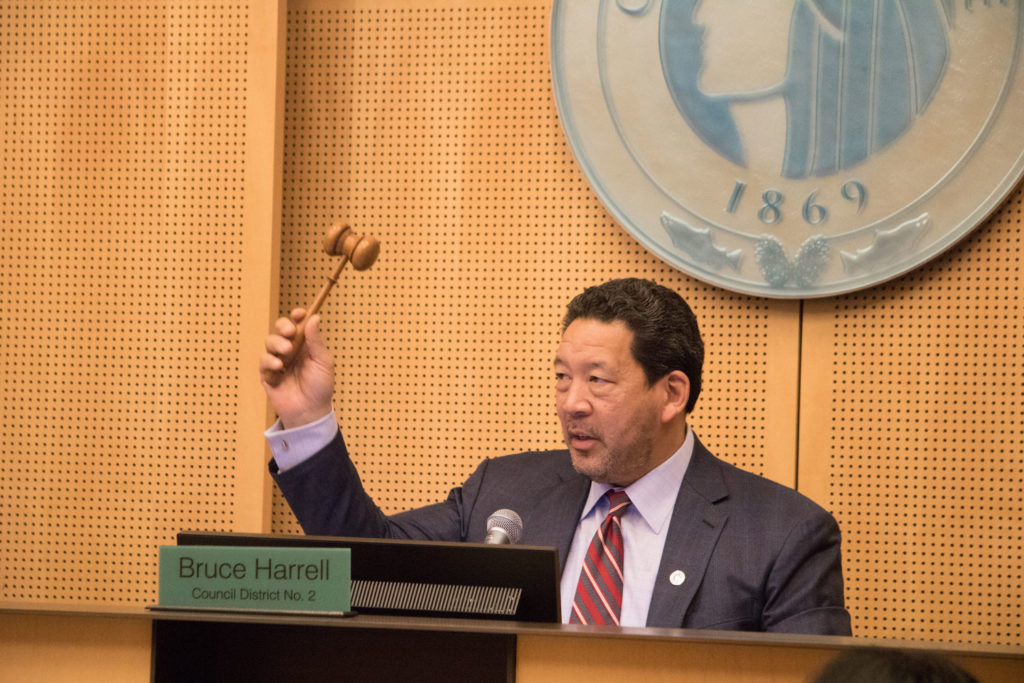The race to succeed outgoing Seattle Mayor Jenny Durkan is getting more crowded by the day, with a growing field of contenders.
On Tuesday, March 16th, Bruce Harrell declared his candidacy in an open letter to the city. The former Seattle City Councilmember is the only candidate among the growing field to have already held the job… briefly, anyway.

Harrell was born in 1958 in Seattle to a biracial, working-class family (his Black father worked for City Light; his Japanese American mother worked as a librarian). A talented football player, he attended the University of Washington on a football scholarship and earned a law degree in 1984.
After two decades in private law, Harrell ran for and won a seat on the City Council in 2007. He kept the job for the next twelve years, becoming Council President in 2016. During his time in the council, Harrell participated in the adoption of some important ordinances, including the nation’s first $15 minimum wage, and a law that “banned the box,” making it illegal to ask about an applicant’s criminal record in the hiring process. He was also one of the first elected representatives to call for the Seattle Police Department to wear body cameras.
In 2013, Harrell ran for mayor unsuccessfully, coming fourth in the Top Two.
But in 2017, he suddenly became mayor when he was thrust into the job by the resignation of then Mayor Ed Murray. (Murray faced multiple accusations of sexual abuse and child molestation from the 1970s and 80s). Harrell, as Council President, was next-in-line for the job, and became acting mayor on September 13th – less than two months before the mayoral election.
The city’s plan of government gave Harrell the option of remaining as acting mayor or returning to the council. Remaining as interim mayor would have meant stepping down from the council. Harrell chose to stay on the council to finish out his term, and left the job after five days. In 2019, he opted not to run for re-election to his seat, and instead returned to his private legal practice.
Now Harrell is back, and hoping the second time is the charm.
The city’s business community has been clamoring for a candidate like Harrell to enter the mayoral race to assume Durkan’s mantle. Jon Scholes, the President and CEO of the Downtown Seattle Association, described him as a figure of “interest and intrigue” among business leaders in mid-February.
Unlike most of his most prominent rivals, Harrell is not a dyed-in-the-wool progressive. Alongside support for causes like the minimum wage, he has taken some concerning stances throughout his career. Memorably, Harrell voted against — and then fiercely criticized — the city’s democracy voucher program.
In 2015, he chose Indigenous People’s Day of all days to praise Christopher Columbus in a resolution proposing an Italian Heritage Month.
Most disturbing of all, Harrell staunchly defended Ed Murray in 2017, claiming that “[Seattleites] did not ask us to judge anyone for something that happened thirty-three years ago or maybe didn’t happen.” Interestingly, one of Harrell’s chief rivals in 2021 is Lorena Gonzalez, who adopted a stance contrary to that of Harrell’s in 2017 as the first council member to call for Murray’s resignation.
In this election, Harrell is pitching himself as a pro-business candidate. This strategy can plainly be seen in his open letter. Harrell says that is his vision is for Seattle to be known as “the city that values and promotes jobs, jobs, and jobs.”
On homelessness, his emphasis is on voluntary civic engagement rather than investment by the city, and wants to match funding for our most vulnerable residents to money for cleanup efforts, clearly prioritizing wealthy residents who consider homelessness an eyesore rather than a humanitarian crisis.
Harrell has spoken critically of efforts to reform the Seattle Police Department as “arbitrary and divisive”. Harrell favors boosting police spending and bringing in big tech companies in to expand surveillance technologies — positions that are sharply at odds with the views of most progressive activists.
In the 2019 council elections, the Downtown Seattle Association poured an unprecedented $2 million (half of which was supplied by Amazon) into campaigns to support candidates preferred by the business community.
However, voters responded to Amazon’s power play by cementing the Council’s progressive majority. Due to having chosen not to run again, Harrell avoided being caught in the middle of that dynamic two years ago.
Now that Harrell is a candidate again, voters will be scrutinizing his positions on issues like money in politics and police accountability.
The Top Two election will be held on August 3rd; the top two candidates will proceed to the general election runoff on November 2nd.


Comments are closed.